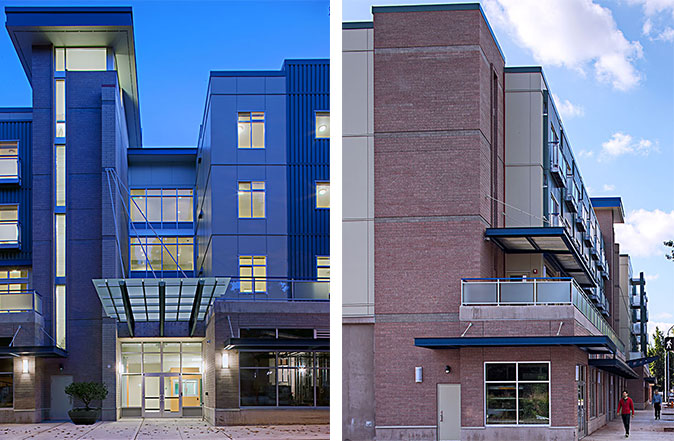Renton, Washington
The Renton Compass Veteran’s Center exemplifies an innovative partnership with a religious organization that saw their real property assets being underutilized. The Lutheran Church partnered with another, community-based organization, Compass Housing Alliance, and private developer, Shelter Resources, Inc. (SRI) This partnering resulted in providing both housing and support services to homeless veterans and veterans with children from Renton and greater King County. The Compass Veteran’s Center in Renton achieves a success level that the Regional Veterans Affairs (VA) administrator says “sets a new bar nationwide”. The project has become a national model for future VA supportive-service residential projects.
Nationwide, all VA supportive housing has typically been designed for single individuals, typically from the Vietnam era, in “barracks” style housing. This project took a different approach. It specifically and carefully considered both the traditional single veteran as well as new veterans; ones with dependents – often single women with children. This emerging group of veterans is a result of the changing nature of the demographics of the military and evolving nature of recent deployments. The development team collaborated with the VA to provide supportive service housing for this “uncharted” but recognized demographic group.

At the groundbreaking, U.S. Senator Patty Murray, who helped secure the federal VA funding said, “I can’t wait to see more veterans getting support from the community they so deserve.” Additionally, this project was the City of Renton’s only major redevelopment under actual construction during the 2008-2010 recession.
The project was initially inspired by Renton Lutheran Church, when they recognized that their congregation was diminishing and could no longer support itself and its social ministries. The development team approached the church leaders and indicated that the church could leverage their primary asset, their land, with Compass Housing Alliance’s complementary mission-based housing experience and services, and SRI’s development expertise to create a continuing legacy for the church; one that would have a long-term, positive, social impact on the broader community. The resulting redevelopment of the site provided for:
- 59 units of supportive service housing for individual veterans and veterans with dependents.
- A new ministry space for the NW Lutheran Synod in the form of a street front café that provides an alternative forum for younger members of the community searching for spirituality but eschewing traditional church settings. This is part of the commercial component of the project.
- Additional street-front commercial components, leased by the Veterans Administration for its community outreach and case management programs and a profitable thrift store.
Additionally, the development team led by SRI coordinated the desires of the City of Renton, the Renton School District, Renton Technical College, various Renton community organizations and the various Renton Lutheran congregations into the overall project outcome.
The Project was the first in the nation to utilize LIHTC financing along with VA Per Diem Capital Grant and Supportive Service Financing. It is also the first VA Per Diem supportive service project in the nation to include not only individual veterans but also veterans with dependents. In addition, the project was able to secure a HUD project-based Section 8 HAP contract for 22 veterans with dependents utilizing the new HUD Section 8 Veterans Affairs Supportive Housing (VASH) rental assistance program. In addition, the project was the first project in Washington State to close utilizing Section 1602 Exchange 2009 ARRA funds. This was no small accomplishment in that the US Treasury had not fully finalized all the operational issues associated with the 1602 Exchange financing. Additionally, the project was financed by the King County Veterans and Human Service Levy, the Washington State Housing Trust Fund, a Federal Home Loan Bank (FHLB) affordable housing program grant, commercial bank loans and developer equity. Total development costs were $17.8 million.